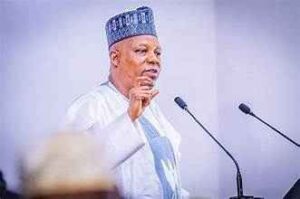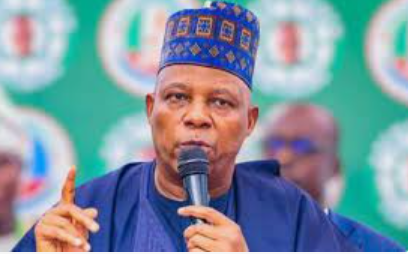Vice President Kashim Shettima has expressed strong confidence that Nigeria will emerge as the leading hub for opportunities in the global halal economy.
His statement came during the Halal Economy Stakeholders Engagement Programme held on Wednesday at the Presidential Villa in Abuja.
Shettima emphasized that while Nigeria’s economic and demographic advantages position it uniquely for this growth, the country must first address its weaknesses and leverage its strengths to seize this opportunity. He highlighted the projected market value of the global halal economy, which is expected to reach $7.7 trillion by 2025.
“For Nigeria to become a leading player in the global halal economy, we must prioritize our strengths and reassess our weaknesses,” Shettima stated. “Today’s engagement is a step towards collaborating with key international organizations to develop a comprehensive halal ecosystem and strategize on becoming a top halal exporter.”

He praised the private sector’s contributions, particularly in finance, and urged all stakeholders to partner with President Bola Ahmed Tinubu’s administration to develop the halal sector. Shettima proposed attracting international investment through investor summits, roadshows, and business matchmaking events, and leveraging the African Continental Free Trade Area (AfCFTA) to enhance Nigeria’s role as a supplier of halal goods and services across Africa.
Shettima acknowledged the significant potential of the halal market, which aligns with President Tinubu’s agenda, and urged increased public awareness, strategic orientation campaigns, specialized training, and deeper global market engagement. He also noted the halal economy’s ethical principles and rigorous standards, which appeal to a broad consumer base.
In addition, Shettima addressed the previous lack of clarity around halal compliance, which he said had stifled potential investments. He welcomed the growing awareness among Nigerians about the importance of investing in halal-compliant products and services.
Deputy Chief of Staff to the President, Sen. Ibrahim Hassan Hadejia, highlighted Nigeria’s ambition to lead in the global halal market, while Special Assistant to the President on Export Expansion, Aliyu Bunu Sheriff, discussed potential GDP growth through increased halal exports to Organisation of Islamic Cooperation (OIC) countries.
Minister of Agriculture and Food Security, Sen. Abubakar Kyari, shared that Nigeria’s domestic spending on halal products reached approximately $107 billion in 2022 and is projected to grow to $180 billion by 2027, making Nigeria the 8th largest halal economy globally.
Minister of Finance and Coordinating Minister of the Economy, Wale Edun, pointed out that halal products cater to a wide market beyond Muslims, with over 125 halal-certified products offering significant growth opportunities.
The government is also working with international bodies such as the Islamic Development Bank (ISDB), Arab Bank for Economic Development in Africa (BADEA), and the Halal Product Development Company, Saudi Arabia (HPDC), to ensure Nigerian halal products meet global standards.
Ambassador Isiaka Abdulqadir Imam, Secretary-General of the D-8 Organisation for Economic Cooperation, emphasized the organization’s efforts to boost intra-trade among its 1.16 billion members, noting that enhancing trade in the halal industry is a key component of their strategy.
The Halal Economy Stakeholders Engagement Programme underscored Nigeria’s potential to lead in the halal sector and outlined strategies to elevate its position in the global market.




